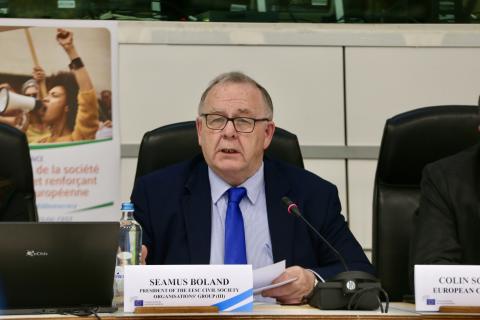European Economic
and Social Committee
Speech by President Séamus Boland on 30 March 2023
Conference on 'Civil society organisations defending and strengthening European democracy' organised by the EESC's Civil Society Organisations' Group
Esteemed guests, ladies and gentlemen,
It is with great pleasure that I welcome you to this conference of our Group, on the topic 'Civil society organisations defending and strengthening European democracy'. This event follows on from both the recent Civil Society Days of the EESC and the Committee resolution, 'United in Democracy', which was adopted last week. But before getting into the crux of today's topic, I would like to start by thanking Jan Dirx, our Group III Vice-President, for having played a crucial role in the direction and preparation of this event. I have always said that the success of our activities depends on collective effort and this is certainly a case in point!
Ladies and gentlemen, there is no doubt that every year, the civic space in our democracies is shrinking. Governments are becoming less accountable to citizens. Authoritarian leaders are becoming more oppressive and weak democracies crumbling. 1989 marked the victory of liberal democracies. But today, liberal democracy is under attack everywhere. It is not an exaggeration to speak of 'democracy's retreat'.
Despite, or perhaps because of this bleak picture, the EU has made the defence of democracy a central pillar to its identity and values. We have become such ardent supporters of democracy, that one could almost forget the centuries of imperialism and totalitarianism in our European history.
But one item that we should definitely remember, is that democracy cannot be taken for granted. It has to be nurtured and protected every day. And allow me to quote the 19th Century American abolitionist Frederick Douglas, who stated and I quote: The price of liberty is eternal vigilance
. Wise words spoken 200 years ago.
The second item we should remember, is that the founding principles of democracy are equality, justice, freedom, respect and solidarity. These are values that relate directly to people and communities.
The links between democracy and equality are particularly strong and defined post World War II identities. In the West, it was generally accepted that these countries were becoming prosperous, precisely because they were democracies. Today, increasing inequalities are often linked to the retreat of liberal democracy and to the dominance of extreme right and left-wing politics.
The links between democracy and freedom are also very strong. Already in 2017, the think tank Freedom House announced that only 13% of the world's population live in a country with true free press. This is shocking, when we reflect on how independent thinking is a precondition for democratic life!
The truth is, that in times of crisis, it is not always politicians who make the difference and rouse us from indifference. As History shows, the true agents of change are often artists, civil society and individual citizens. One only has to reflect on their role during the Covid pandemic and the war of aggression against Ukraine.
It is precisely for this reason, that independent civil society organisations have a crucial role to play in maintaining the resilience of our democracies. On several occasions I have spoken of the role of civil society organisations as 'guardians of the common good', with a pivotal role in identifying sustainable solutions, promoting societal innovation and making politics and policies more relevant and legitimate to citizens.
And despite the accusations by some States that CSOs are 'public enemies', the reality is that independent CSOs build mutual trust in societies, shape public opinions and act as positive agents of change. Often this entails defending and promoting freedom of expression and media diversity, against disinformation and media monopolies.
Perhaps what is less well known, is the crucial role of CSOs in communicating the benefits of democracy to citizens. For if citizens do not understand the concepts of fundamental rights and the rule of law, then they will not know when these principles are threatened, nor will they take action to defend them.
Ladies and gentlemen, this morning you will hear many concrete recommendations on how to strengthen the role of CSOs in democracy. You will certainly hear about the necessity for a European Strategy for Civil Society, for a European Statute of Associations and for a chapter on civil society in the forthcoming review of the European Democracy Action Plan. I encourage you to fully engage in today's discussions and share your knowledge and experiences!
I will bring my comments to a close by looking to the future and specifically to the European elections next year. Democracy is of course much more than elections, but it does remain a fundamental element. And when I look to the future, I think of our youth, many of whom will be first time voters next year. And I recall the words of the ancient Greek philosopher Diogenes, who over 2,000 years ago stated that The foundation of every State is the education of its youth
. If we want to protect democracy in Europe, then education on democratic citizenship and human rights should be a priority at both the national and EU levels. That is the responsibility of every single person here today!
Thank you for your attention.
Work organisation
Downloads
-
Speech by Séamus Boland
